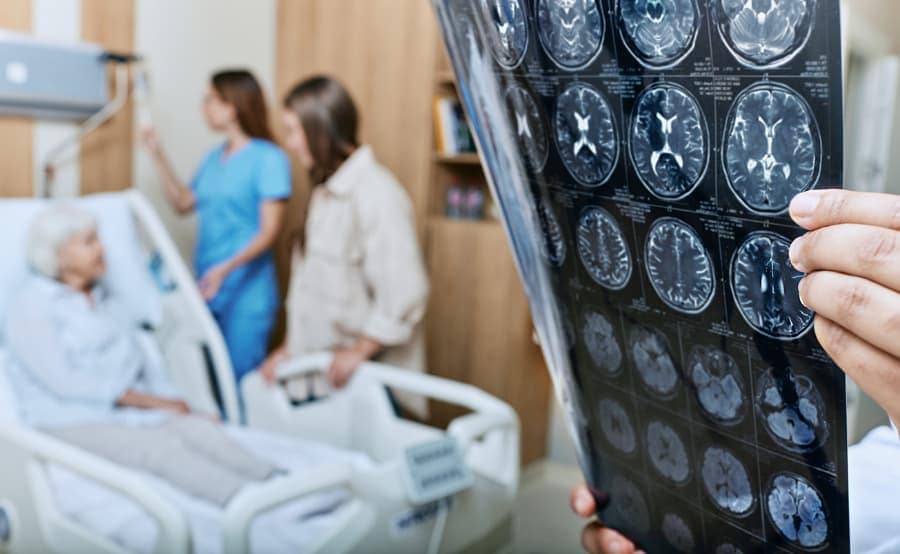In the United States, more than 795,000 people have a stroke each year, which equates to about one stroke every 40 seconds. It is the fifth leading cause of death, claiming around 140,000 lives annually. Of those who are fortunate to survive a stroke, many are faced with long-term disabilities that challenge their independence and ability to perform everyday tasks.
Physicians recommend patients take proactive measures and use an Insertable Cardiac Monitor (ICM) so they can better identify stroke risk factors. Richmond University Medical Center, serving patients on Staten Island, provides details how this device works and how it benefits patients:
What Is a Stroke?
A stroke is a life-threatening medical emergency that happens when blood flow to the brain is suddenly cut off. This can occur when a blood vessel in the brain becomes blocked or narrowed, or when a blood vessel bursts and spills blood into the brain.
The resulting oxygen and nutrient deprivation causes brain cells in the affected area to die within minutes. Depending on which area of the brain is affected, a person who experiences a stroke can lose certain functions such as memory or muscle control.
The severity of strokes varies depending on their location and the extent of the damage they cause. For instance, people who have small strokes may experience temporary issues, while those who have large strokes may suffer from serious permanent disabilities.
Stroke Risk Factors
No one is immune to having a stroke. However, some people are more prone to one based on certain factors. Many common medical conditions can increase a person’s chances of having a stroke, including:
- High blood pressure
- High cholesterol
- Heart disease
- Diabetes
- Obesity
- Sickle cell disease
Certain lifestyle choices can lead to an increased risk of stroke, as well. Unhealthy habits that make a person more likely to have a stroke include:
- Smoking and exposure to secondhand smoke
- Drinking alcohol in excess
- Consuming an unhealthy diet
- Not getting enough physical activity
The Benefits of an Insertable Cardiac Monitor (ICM)
An ICM is a small, lightweight device that plays a significant role in stroke care. No bigger than a paperclip, the device is injected by a syringe and implanted under the skin in the anterior chest while the patient is under local anesthesia. Staying in place for up to 4½ years, the device serves as a continuous monitor, checking heart activity 24/7 in five-minute intervals.
The ICM device uses electrodes to analyze signals and identify the presence of any abnormalities with the heart, including slow, fast, or extra heartbeats. The device records the time the abnormality took place, how long it lasted, and how fast the heart was beating. The ICM device also provides an electrocardiogram (EKG), which measures the electrical signals in the heart.
This information gets sent to the patient’s physician for further evaluation. The ICM is a crucial aid in helping physicians identify the cause of strokes in a large segment of patients. This useful device allows physicians to care for their patients more efficiently and ensure they receive the right type of treatment to avoid another event in the future.
Stroke Care at Richmond University Medical Center
Richmond University Medical Center is a designated stroke center by the New York State Department of Health. Our innovative institution continuously stays up to date on the latest research to provide patients with the most effective care.
The highly trained stroke care team provides patients with necessary emergency treatment, as well as continued care on the road to recovery. Richmond University Medical Center’s stroke services include the ICM loop monitor, along with other highly effective procedures. Our goal is to assure the Staten Island community has access to the highest quality stroke care.
For our efforts, Richmond University Medical Center has earned several highly coveted honors and awards. Our institution has been awarded the Get With the Guidelines-Stroke Gold Plus Quality Achievement Award from the American Heart Association/American Stroke Association. We are also the proud recipient of the Joint Commission’s Gold Seal of Approval for quality and patient safety.
Receive Award-Winning Stroke Care on Staten Island
When it comes to a stroke, every minute counts. Patients experiencing symptoms and warning signs should seek the professional stroke care offered by the dedicated team at Richmond University Medical Center. With expertise in effective treatments, we work diligently to reverse or minimize the effects of a stroke. Patients who believe they have signs of a stroke or are at high risk for stroke should schedule an appointment with our team.




